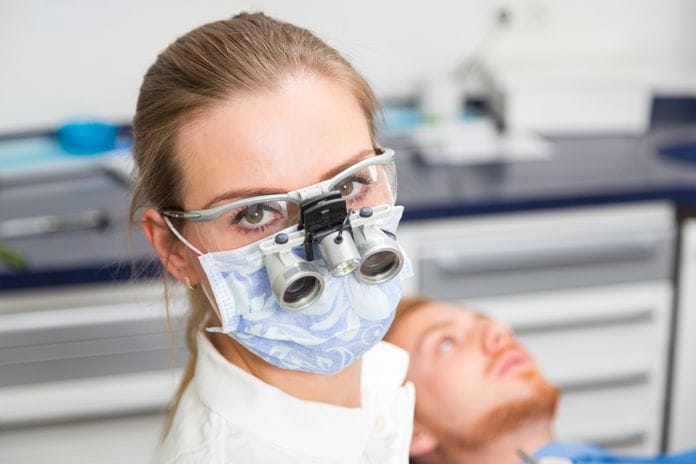The first surgical loupes date back to 1876 and consisted of simple, convex lenses that attached to a spectacle frame or a headband1. Loupes have been used by zoologists, ophthalmologists, surgeons, and of course, dental professionals. Loupes have evolved and improved tremendously over the decades; they come in a variety of styles, frames, and magnifications. Loupes can be customized to incorporate a vision Rx, adapted to fit a headlight, and be through-the-lens mounted or flip-up.
As a 14-year, dental hygiene veteran, I am about to make a very bold confession – I did not own or use loupes until earlier this year. But wait, there is more! I thought I did not need them, as if I was an exception to the rule. That statement alone is embarrassing and now is perplexing to me. The only conclusion I can muster for this rationale is complete naivety.
I often hear new graduates speak about how they purchased their loupes while in dental hygiene school for the amazing student discount. Disappointingly, my school was not visited by any loupe manufacturer reps. I honestly did not know they existed until well into my career. I found them odd at first and did not know enough to make an educated opinion. Approximately five years into my career, I worked for a female dentist who used loupes. I was intrigued and wanted so badly to put them on and see what the hype was about it. I refrained and never found the courage to ask.
It wasn’t until the active days of social media I started to hear more discussion about loupes. I read almost every post about this hot topic and remained enthralled, but never acted upon that curiosity. During an eye exam, I mentioned loupes to my optometrist. He quickly and vaguely suggested I did not pursue or purchase loupes. Many would have questioned his opinion on the matter, but for some reason, I did not and laid the subject to rest. I suppose it was because I didn’t know enough myself to debate the topic. However now, after looking into the question of if loupes weaken eyesight or affect vision, there is no evidence of this. Eyes naturally weaken, and vision acuity declines, as a person ages2. Loupes help prevent eye strain and do not weaken or affect the eye, nor do they cause the user to become compromised in any way2,3.
For the past few years, I feel the loupe topic has been heavily debated and discussed on dental Facebook sites more so than ever. I have seen and read many articles in dental publications about loupes as well. I would read each one thoroughly, and finally, after years in the dark, I understood what this set of eyewear brought to the table. But then I would, unfortunately, remember what my optometrist said and used it has a scapegoat not to purchase.
In the past year, I have begun to feel the toll the dental hygiene career can have on the body if ergonomics are not practiced. I can promise you it wasn’t with intent that I slouched over in my chair to see calculus a little better or that I sat less than straight in my chair. I fell victim to a career not embraced with the elements to assist in my duties. I knew something needed to change and soon for the sake of my career and health. My mind immediately retraced its steps back to the loupes topic.
Around this same time, I was planning my first ever dental conference meeting at the Chicago Midwinter Meeting. I read many of the loupe manufacturers offer special pricing during the conference, so I made it my mission to visit each of their booths while there. I comprised a list of questions I had, and after visiting each booth, I made a successful loupes purchase.
I was eager to get my loupes and anxiously checked my email for the shipping confirmation every day. When they finally arrived I was beyond excited, but a little nervous as well. The first patient I wore them with I was a little (okay a lot!) shaky. I felt like I was cleaning with new eyes. Well, actually I was. It was simply astounding how well I could see. I was seeing the mouth in a whole new way. I did not have to lean over or hope I removed the calculus efficiently. I could see every single aspect of my patient’s mouth without fail. As the rep suggested, I wore my loupes every other patient, so I could properly become adjusted. I hated taking them off because I knew I could see so much clearer with them on.
After a week I began wearing them consistently. Probing has been taken to a whole new level. Gone are the days I have to probe a pocket and lean forward to struggle to conjecture the reading. Because of the field of focus, I am forced to sit straighter and I have noticed the fatigue in my back is no longer as prominent at the end of each day. I feel so much more confident at the end of each appointment. I no longer need my overhead light, as the light on my loupes gives me a direct beam of light exactly where I need it when I need it. My career has changed immensely since this purchase.
Because of my newfound love, I decided to see where other dental hygienists stood on this subject. Out of 100 polled dental hygienists, only 16 did not own loupes. The biggest reason many have not purchased loupes is due to cost. Of the 84% that do own loupes, 52% of those dental hygienists have worn them for 1-5 years, with only 5% wearing them 15 + years. The most common response to why loupes were purchased was to help with back and neck pain. Of the 100 dental hygienists polled 82% purchased the loupes themselves.
It appears I am not alone in my journey with loupes. Newer graduates are likely never to have worked without loupes, while those who graduated prior to loupe popularity are likely to struggle with this decision. Don’t! Seriously, it will change your career and take it to a whole new level. I suggest going to a dental conference so you can visit the various manufacturers that offer loupes. By doing this, you are able to seek out the answers to all the questions you may have. It is nice to have recommendations from your peers, but in all honesty, only you can make the decision on which loupe manufacturer you feel the most impressed and comfortable with.
Go back to your hotel and look over each company and do not make any immediate decisions. Do not feel pressured! Once you have narrowed down the manufacturer you feel is best suited for you, the rest is easy. Make sure to inquire about conference price, go ahead and get fitted and make a frame selection. Don’t forget the light! It is pivotal, and you will thank yourself later. The hardest part is waiting for the loupes to arrive! My loupes took around three weeks to arrive at my doorstep. While many fret over the price, keep in mind, you simply cannot put a price on your health. I simply saved my money so I could afford to make the purchase without strain. Some manufacturers even offer payment plan options.
When initially wearing your loupes, only wear them for every other patient, for a few days to a week. This allows your eyes to make the adjustment that is required without strain. You can practice at home painting your nails if you feel you need extra adjustment time. You may get frustrated at first, because I sure did, as there is a whole new learning curve when wearing loupes. Don’t let that scare you away. It is no different than anything else that is new and different. I equate it to adjusting to wearing a retainer after the completion of ortho treatment. Try not to toggle too much from loupes to frames too often, or you will get a “drunk” feeling. It took me a week to adapt completely to wearing my new eyes, and now I wear them as if I have been using them for years.
Loupes have revamped my career. After 14 years without them, I feel like I am taking my treatment to a whole new level. The efficiency and clarity that loupes bring is priceless. The only thing I regret is not getting them sooner.
SEE ALSO: Ergonomics: If I’d Only Known
DON’T MISS: Top 10 Essentials for Every Hygienist’s Toolkit
References
- Kwitko, Marvin L. Kelman, Charles D. (2011, August 18) A Short History of Surgical Loupes. https://admetecvision.wordpress.com/2011/08/18/a-short-history-of-surgical-loupes/
- Alhazzazi, T.Y., et al. ( 2017). Awareness and Attitude Toward Using Dental Magnification Among Dental Students and Residents at King Abdulaziz University, Faculty of Dentistry. BMC Oral Health. 2017; 17: 21. Retrieved from https://www.ncbi.nlm.nih.gov/pmc/articles/PMC4950692/
- Christensen, G. (Dec. 2003). Magnification in Dentistry: Useful Tool or Another Gimmick? JADA, Vol. 34.












